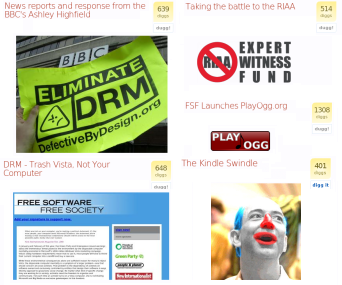We have often described many reasons to avoid the iPhone.
Here is an opportunity to have some fun and get answers about the iPhone, straight from the horse's mouth, so to speak.
In every Apple retail store is a so-called "Genius Bar" -- a technical support station, the purpose of which is to offer help and support for Apple products.
You can use Apple's helpful online booking system (no registration required) to reserve time
slots at the Genius Bar. There are currently 364 Apple stores in 13 countries, giving us plenty of slots to book. Several years ago, we held a two-day, worldwide iPhone Challenge, but you can keep up the pressure by continuing to visit your local Genius Bar and giving Apple the iPhone Challenge.
Take these three easy steps to give Apple our iPhone Challenge:
1) Book a 10-minute slot now!
Book online: USA, Australia, Belgium, Brazil, Canada, China, France, Germany, Hong Kong, Italy, Japan, Macau, Mexico, Netherlands, Singapore, Spain, Sweden, Switzerland, Taiwan, Turkey, the United Kingdom, United Arab Emirates.
2) Let us know which stores you have
booked using our online counter.
3) Microblog about this, to encourage others to participate
At the Genius Bar....
Print out our handy
questionnaire
and information about how iPhone 3G restricts your freedom. If you
have access to a color printer, you can also print out some of our
snazzy iPhone flyers to hand out to people
outside the store when you're done.
Head over to your local Apple Store at your designated time. Be sure
to get a business card from your Genius first and then politely ask
them the questions. For each question, give them a score between 1 and
32, with 1 being a really bad answer, and 32 being an answer that
really showed insight into the restrictive practices of the iPhone.
The total score will be out of 160 -- the IQ level of Einstein, a
certified genius. Rate your Genius's iQ to the same score, and if they
get over 130, they're a genius -- any lower than that, and they're
screwed. Glory and infamy awaits!
If you feel your Genius did particularly well, or particularly
badly, please let us know their name, email address, and the store
address -- it'll be on their business card. We'll send prizes and
information accordingly.
Questions
Start by introducing yourself to your Genius.
"I'm from the DRM elimination crew at DefectiveByDesign.org -- I'd
like to ask you a few questions about the defects Apple has designed
into the iPhone 3G."
Why do all developers have to submit their applications to Apple before
they can be loaded onto an iPhone?
Most smartphones, including those by OpenMoko, Nokia, RIM, Palm
and even Microsoft, allow applications to come from a variety of
sources, including free software developers. Free "as in freedom"
software development requires that users and developers be able
to share and modify the source code for programs they use. iPhone
users are not permitted by Apple to share or load modified
versions of programs distributed through the App Store -- even
when a program's developer wants users to be able to do this!
Apple markets itself as empowering, alternative technology -- How
does Apple plan to support free software development?
Why does iTunes still contain so much DRM-laden music?
Services like Amazon, eMusic, Napster, Rhapsody, Play.com and
7digital are all selling music without DRM. A typical response to
this might be that Apple has no option to sell media without DRM,
but this is simply untrue. Jobs is the largest individual shareholder at
Disney, and he could insist that its films be DRM-free. Apple
should be leading the way to promote DRM-free music, but instead
is lagging behind. What is Apple doing to fix this? If it really
is the RIAA's fault, can you tell me specifically what the RIAA
said to Jobs when he asked for the ability to sell DRM-free
music?
The iPhone 3G has GPS support. How can users be sure that the GPS
cannot be used to track their position, without their permission?
When the only thing preventing the GPS from being used is
software, and the software in question is known only to Apple,
why should iPhone users trust Apple? There is a privacy
agreement, but how would I ever know that the agreement was
violated?
In 'Thoughts on Music', Steve Jobs said, "it is useful to remember
that all iPods play music that is free of any DRM and encoded in
'open' licensable formats such as MP3 and AAC".
If Jobs really wants to see open formats, why doesn't the iPhone
play Ogg Vorbis, Ogg Theora video and FLAC? These formats require
no licensing costs, and are not encumbered by patents. How does
Apple plan to support these formats in the future? Will Apple
approve applications for the App Store that support these
formats?
Last question. Why can the iPhone 3G only be activated by Apple and
AT&T?
In the United States, the Register of Copyrights has ruled that
consumers have the right to unlock their phones and switch to a
different carrier. How does Apple plan to remedy this
discrepancy?
Next steps
Give your Genius their score, your contact information (if you want)
and your handout, along with any additional feedback you have about
the defects in iPhone 3G. Thank them for their time, and quickly and
politely leave the store. Outside the store, distribute some of the
flyers and spend some time talking to people about these issues.
Let us know how it went by sending an email to
info@defectivebydesign.org with your Genius's information, score,
and your comments.













